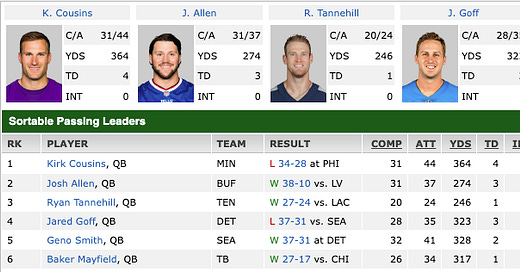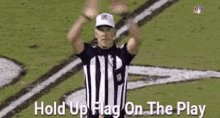With time to consider: Week 2
Was I too hard on Geno Smith and the Seahawks offense? It's time to change our perceptions of QB stats (again): Seaside Joe 1661
When Seattle took a 31-21 lead against the Lions thanks to Tre Brown’s pick-six off of Jared Goff, I texted a friend that I had forgotten what it was like to feel relief during a Seahawks game. There were only eight minutes left on the clock and Detroit had gone fumble, touchdown, turnover on downs, interception on their previous four drives of the second half—plus I have always felt one way about Goff, which is that he isn’t good—so I hadn’t done what I should have done and prepared myself for potential disappointment.
It took five minutes for the Lions to cut the lead to 31-28, leaving only 3:03 in regulation when the Seahawks got the ball back, and immediately I thought back to something I wrote in my Vision Board article from Saturday:
“But if the Seahawks were able to stop the run in the second half of games that they’re trailing in, or run the ball effectively when they have the lead, then they would have a better shot of winning the game, no?
That was the Marshawn Lynch effect on offense for several years, never better served than in a win over the Ravens in 2011, when Lynch helped Seattle run off the final six minutes of the game in 22-17 victory.
How you play the run in the fourth quarter of the game IS important, whether you’re winning or losing at the time.” - Seaside Joe (2019-????)
Oh awesome, now here comes Pete “Run Lola Run” Carroll with a chance to prove to rushing critics that once again the Seattle Seahawks could win a game because they run the ball effectively and stop the run.
First play: Geno Smith to pass, almost sacked, he manages to get two yards on a scramble.
Okay, haha, hehe, that’s basically as effective as handing it to Ken Walker, right? Same difference! Here we will go with a run on second down…
Second play: Geno Smith attempted screen pass to Colby Parkinson is batted down, clock stops at 2:20, here comes third-and-8.
Well, I guess what are the odds that such an easy pass wouldn’t be completed, right? Freak occurence! Like throwing a quick slant at the 1-yard line, what could go wrong?
Third play: Geno Smith pass to a wide open Colby Parkinson, 16-yard gain, first down!
Woo boy, that was a close one. Well, it was fun to have a little bit of anxiousness about how this game would end after all, haha. No problem, moving onto Caroli—
Colby Parkinson, offensive pass interference. Clock is stopped at 2:11 and it is third-and-18 at the 20 and the Lions have all three timeouts. Oh well, see if you can run the clock down to the two minute warning and then have Michael Dickson punt Goff back to Los Angeles, give your defense a chance to win the game for you because he’s not the type of quarterback who leads a two-minute offense.
Fourth play: Strike fear and anxiety into the hearts of your fanbase for no reason
At no point during Geno Smith’s :14 second scramble did I say anything other than “get rid of it!” I didn’t want him to run for a first down, I didn’t want him to throw for a first down, I didn’t want him to keep trying at all.
If there’s a quarterback who has shown over the last 10 years that there’s no “quit” in him, it’s Geno Smith, but this was just rubbing our faces in it.
It’s easy for me to write that from the comfort of home, not under duress with the game on the line, but that’s why there are only 17 quarterbacks on Earth who make more money per season than his $25 million. If Geno only plays out the first year of his contract, he gets to make $1.58 million per game in 2023. That means that if he has 70 dropbacks, that Geno Smith was paid $22,571.42 cents for that single play.
If I were ownership, I would want back all but 0.42 cents for that one.
I don’t read replies to tweets, but I know that there were some people upset and in strong disagreement with my criticism of Geno’s performance in Sunday’s WIN over the Detroit Lions. I can tell from reading other people’s articles and watching other people’s videos that my opinion on this player is also in the minority of Geno takeaways from Week 2.
That’s okay.
What would be the point of mass media and the Internet if you just read 100 takes saying the exact same thing? There are echo chambers for that, if that’s what you want. I have always said that Seaside Joe will not pay lip service to players or coaches just because they work for the Seahawks—there are plenty of other places for that too—and that the only value that I can bring to you in covering this team is being 100-percent honest about it as I see it. That’s why the post-game articles are called “As I See It”.
How can I be honest about the subject I’m covering if I’m afraid that criticizing the Seahawks might lose me a follower or a subscriber or upset a group of random people on Twitter who didn’t even know I existed until yesterday? I don’t write to gain subscribers and I don’t write to not lose subscribers, I just write what I see and stick as close to the truth as I can get and have faith that that’s good enough to keep growing.
Right after the Seahawks beat the Lions, I wrote that Geno Smith had a bad game—or more accurately, I wrote that “he wasn’t even good” which could also be interpreted to mean that he was average—and I feel just as confident about that take even with more time to consider…I’ll give more reasons for that later in the article.
(In short, there are two types of NFL fans: Ones who want Kirk Cousins because they fear Zach Wilson; and ones who don’t want to settle for Kirk Cousins because they fear Kirk Cousins.)
However, I will add that writing an immediate post-game reaction to what happened could have muddled my perception of Geno’s overall performance due to the fact that I actually expected, for once, that the Seahawks would be able to coast to a win in the final eight minutes. That’s obviously not what happened, but it wasn’t entirely Geno’s fault and the post-game write-up “We need to talk about Geno” probably didn’t do a good job of spreading responsibility to other parties.
Like the fact that the defense allowed Jared Goff to drive the Lions 75 yards with conversions on third-and-12 and third-and-7.
Or whatever caused Shane Waldron to call plays that only ran one minute off the clock without forcing Detroit to use a single timeout.
Or that even though Seattle’s offense only scored 24 points in regulation, Seattle’s special teams left 3 to 6 points off the board that we would normally count. I wrote last week that the Seahawks needed to start scoring 30 points with Geno in order to be successful and that’s basically what he did. I should have given him credit for that.
Then Seattle’s offense went 75 yards in overtime to guarantee that the defense wouldn’t have to see the field again (there is only one type of football fan: one who doesn’t want to see the defense back out there again), and that’s a credit that I didn’t give Geno’s offense in the “As I See It” column. I did see it, and now I’m saying it thanks to the benefit of having more time to think about it.
I think the Seahawks offense left points on the board and am concerned that ultimately if Seattle does not find a way to be more explosive and efficient with plays that start with decisions by the quarterback that they will continue to be left behind when the playoffs get down to the final four or final eight teams.
That feeling is as true for me on Monday as it was for me on Sunday, but understandably if it’s the first thing you read in a post-WIN article, you might think that the tone is that “Geno sucks and everyone else rules”.
No, Geno was fine (yes, fine) and the last eight minutes sucked and there were a lot of people (players and coaches) at least partially responsible for why the Seahawks barely won instead of what they should have done, which is win by a lot. That’s the point and I have plenty more to say about it and other items from Week 2’s 37-31 overtime win with more time to consider.
That’s what Monday’s will be for now, a morning after article with more time to think about what happened in the game the previous day.
Continuing with how I judge and value quarterbacks…
We have to keep moving the goal posts on statistical expectations
I know I wrote something about this last year or the year before, but really it’s become an annual tradition to some degree. When I was a kid, a 90 passer rating was REALLY good! Just go back to 2002, the top-five passer ratings were all FM radio stations:
104.2 (Chad Pennington), 97.3 (Rich Gannon), Brad Johnson (92.9), Trent Green (92.6), and Peyton Manning (88.8). Matt Hasselbeck was right behind Manning at 87.8.
There were 20 quarterbacks who had a passer rating in Week 2 that was better than Peyton Manning’s mark in 2002. There were 12 who had a better passer rating than Pennington’s NFL-leading number.
This is absurd. And the fact that Geno had a rating of 116.3 with 328 yards, it just doesn’t come close to giving us enough information to know how good he actually played without watching the game and going deeper behind the completion, yardage, touchdown, and turnover numbers.
And I think that’s roughly 90-percent of how we judge quarterbacks now: “Oh, how many interceptions did he throw?”
It’s the only way I’ve been able to wrap my head around Daniel Jones getting $40 million per year.
But it goes much deeper than that and if Kirk Cousins can throw for 364 yards with four touchdowns in a game that I think was kind of another typical Kirk Cousinsesque loss, or Baker Mayfield can rank well ahead of Patrick Mahomes in passer rating through two games, then how can I muster excitement for any passing stats?
I’ll tell you how we move the goal posts on QB stats this year…





